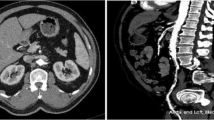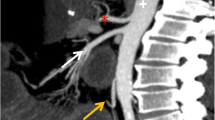Abstract
Aim-Background
Acute mesenteric ischaemia (AMI), although an uncommon condition with a difficult diagnosis, has a high rate of complications and is associated with a high mortality rate. We reviewed our experience of patients presenting with AMI in order to evaluate the current management and factors associated with survival in a tertiary care hospital.
Material and Methods
Clinical data of all patients who were diagnosed with AMI between 01 January 2012 and 30 June 2013 were retrospectively reviewed. Preoperative presentation, investigation, management and outcome in this group of patients were analyzed.
Results
Thirteen patients were included in the study, of whom twelve were male and one female, mean age 44.5 years ranging from 35 to 78 years. The cause of AMI was embolism in three patients (23.1%), and thrombosis in ten patients (76.9%). Abdominal pain was the most common presenting symptom (100%). Four patients (30.8%) had previous symptoms of chronic mesenteric ischaemia in the form of postprandial pain. Nine patients (69.2%) had been exposed to high altitude for more than two weeks, four of whom displayed a procoagulant state. Eleven patients underwent abdominal exploration and endovascular treatment. Percutaneous transcatheter balloon angioplasty was performed in two (15.4%) cases. Eight out of eleven patients (72.7%) who underwent exploratory laparotomy had major small bowel resections involving more than 200 cms of small bowel. However, none of these patients underwent any reconstructive procedures due to extensive thrombus within the SMA and late presentation. Six patients were submitted to second-look exploration within 48 hours, all of whom underwent repeat resections of the bowel. Laparostomies were performed in two patients. None of these patients had a primary anastomosis. End jejunostomy/ileostomy was performed with mucous fistula in all 11 patients. Two patients died within a month, and the 30-day mortality rate was 15.4%; severe sepsis with multiorgan failure was the cause of death in both patients. Four patients (30.8%) had permanent intestinal failure without intestinal adaptation requiring permanent total parenteral nutrition (TPN) with indications for intestinal transplant. The survival rate at one year was 69.2%. Two late deaths occurred owing to complications of TPN.
Conclusion
A relatively uncommon diagnosis, AMI is often identified late and invariably with complications. Exploratory laparotomy with resection of the bowel is the most viable option in such a situation. The individuals exposed to high altitude and displaying a procoagulant state that present with AMI tend to belong to a much younger age group than that reported in the literature. Short bowel syndrome is a frequent long-term complication in surviving patients. Administration of TPN in strict aseptic conditions, control of sepsis, intestinal adaptation and intestinal transplant will increase the long-term survival of these patients.
Similar content being viewed by others
References
Oldenburg WA, Lau LL, Rodenberg TJ, Edmonds HJ, Burger CD. Acute mesenteric ischemia: a clinical review. Arch Intern Med 2004; 164:1054–1062
Cokkinis AJ. Mesenteric Vascular Occlusion. Bailliere, Tindall and Cox, London, 1926
Edwards MS, Cherr GS, Craven TE, Olsen AW, et al. Acute occlusive mesenteric ischemia: Surgical management and outcomes. Ann Vasc Surg 2003; 17:72–79
Schoots IG, Koffeman GI, Legemate DA, Levi M, van Gulik TM. Systematic review of survival after acute mesenteric ischemia according to disease aetiology. Br J Surg 2004; 91:17–27
Ottinger L, Austen WB. A study of 136 patients with mesenteric infarction. Surg Gynecol Obstet 1967; 124:251–261
Stoney RJ, Cunningham CG. Acute mesenteric ischemia. Surgery 1993; 114:489–490
Acosta S. Epidemiology of mesenteric vascular disease: clinical implications. Semin Vasc Surg 2010; 23:4–8
Burns BJ, Brandt LJ. Intestinal ischemia. Gastroenterol Clin north Am 2003; 32:1127–1143
Block T, Nilsson TK, Björck M, Acosta S. Diagnostic accuracy of plasma biomarkers for intestinal ischaemia. Scand J Clin Lab Invest 2008; 68:242–248
Sise MJ. Mesenteric ischemia: the whole spectrum. Scand J Surg 2010; 99:106–110
Acosta S, Björck M. Acute thrombo-embolic occlusion of the superior mesenteric artery: a prospective study in a well defined population. Eur J Vasc Endovasc Surg 2003; 26:179–183
Schoots IG, Levi MM, Reekers JA, Lameris JS, van Gulik TM. Thrombolytic therapy for acute superior mesenteric artery occlusion. J Vasc Interv Radiol 2005; 16:317–329
Chiu YH, Huang MK, How CK, Hsu TF, Chen JD, Chern CH, et al. D-dimer in patients with suspected acute mesenteric ischemia. Am J Emerg Med 2009; 27:975–979
Acosta S, Nilsson T. Current status on plasma biomarkers for acute mesenteric ischemia. J Thromb Thrombolysis 2012; 33:355–361
Thuijls G, van Wijck K, Grootjans J, Derikx JP, van Bijnen AA, Heineman E, et al. Early diagnosis of intestinal ischemia using urinary and plasma fatty acid binding proteins. Ann Surg 2011; 253:303–308
Evennett NJ, Petrov MS, Mittal A, Windsor JA. Systematic review and pooled estimates for the diagnostic accuracy of serological markers for intestinal ischemia. World J Surg 2009; 33:1374–1383
Ridley N, Green SE. Mesenteric arterial thrombosis diagnosed on CT. Am J Roentgenol 2001; 176:549
Aschoff AJ, Stuber G, Becker BW, Hoffmann MH, et al. Evaluation of acute mesenteric ischemia: accuracy of biphasic mesenteric multi-detector CT angiography. Abdom Imaging 2009; 34:345–357
Kirkpatrick ID, Kroeker MA, and Greenberg HM. Biphasic CT with mesenteric CT angiography in the evaluation of acute mesenteric ischemia.Radiology 2003; 229:91–98
Wyers MC. Acute mesenteric ischemia: diagnostic approach and surgical treatment. Semin Vasc Surg 2010; 23:9–20
Ofer A, Abadi S, Nitecki S, Karram T, Kogan I, et al. Multidetector CT angiography in the evaluation of acute mesenteric ischemia. Eur Radiol 2009; 19:24–30
Menke J. Diagnostic accuracy of multidetector CT in acute mesenteric ischaemia:systematic review and meta-analysis. Radiology 2010; 256:93–101
Wiesner W, Hauser A, Steinbrich W. Accuracy of multidetector row computed tomography for the diagnosis of acute bowel ischemia in a non-selected study population. Eur Radiol 2004; 14:2347–2356
Horton KM, Fishman EK. Volume-rendered 3D CT of the mesenteric vasculature: normal anatomic variants and pathologic conditions. Radiographics 2002; 22:161–172
Matsumoto AH, Angle JF, Spinosa DJ, Haqspiel KD, et al. percutaneous transluminal angioplasty and stenting in the treatment of chronic mesenteric ischemia: results and long-term follow up. J Am Coll Surg 2002; 194:S22–S31
Arthurs ZM, Titus J, Bannazadeh M, Eagleton MJ, et al A comparison of endovascular revascularization with traditional therapy for the treatment of acute mesenteric ischemia. J Vasc Surg 2011; 53:698–704
Resch TA, Acosta S, Sonesson B. Endovascular techniques in acute arterial mesenteric ischaemia. Semin Vasc Surg 2010; 23:29–35
Yasuhara H. Acute mesenteric ischemia: the challenge of gastroenterology. Surg Today 2005; 35:185–195
Radu D. The surgical management of the acute ischemic intestinal syndrome, Medical. Surgical Experimental Research, Nr. 2–3/2007, 136–141
Dahlke MH, Asshoff L, Popp FC, Feuerbach S, et al. Mesenteric ischemia-outcome after surgical therapy in 83 patients. Dig Surg 2008; 25:213–219
Author information
Authors and Affiliations
Corresponding author
Rights and permissions
About this article
Cite this article
Routh, D., Naidu, C.S., Rao, P.P. et al. Management of acute mesenteric isxcaemia: A retrospective analysis. Hellenic J Surg 86, 61–67 (2014). https://doi.org/10.1007/s13126-014-0099-8
Received:
Accepted:
Published:
Issue Date:
DOI: https://doi.org/10.1007/s13126-014-0099-8




